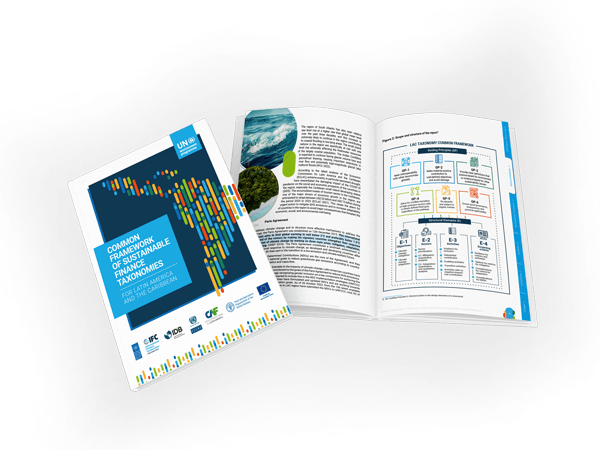Event
Nationally Determined Contributions (NDCs) are the climate commitments that each country defines under the Paris Agreement, detailing the actions it will take to contribute to meeting the objectives of maintaining the global mean temperature increase to well below 2°C, or 1.5°C; of increasing adaptive capacity to the impacts of climate change; and of making finance flows consistent with a pathway towards low-emission and climate-resilient development. NDCs represent short- and medium-term plans, which are updated every five years to gradually increase ambition, based on the best available information and in accordance with each country’s capabilities.
Seven years away from the achievement period of the current NDCs (2030), the countries of Latin America and the Caribbean are facing the challenge to accelerate climate action, by translating their commitments into concrete, measurable and bankable strategies, and actions, ready for financing and implementation. In this process, the participation of the private sector and other non-state actors is key to achieving national and international climate goals, ensuring the buy-in of all stakeholders: private sector, civil society organizations, indigenous peoples, youth, academia, etc. While governments play a key role in defining policies and regulatory frameworks, the private sector and other non-state actors have the power to be a major catalyst for the effective implementation of countries’ NDCs.
To fulfill this role, it is necessary to create and promote tools and guidelines that the private sector and other non-state entities can apply to develop and implement short-, medium- and long-term strategies that are aligned with the NDCs of their countries. This can facilitate the mobilization of significant private investments and resources for emissions reduction and adaptation through the adoption of cleaner technologies, innovation, improved energy efficiency, and the implementation of more sustainable production practices.
In this sense, collaboration between the public and private sectors is essential for effective implementation of climate commitments. Partnerships between governments, businesses, and non-governmental organizations can facilitate cooperation, share knowledge and resources, and overcome the challenges that arise on the road to sustainability.
Against this context, the event has the following objectives:
- Explore the crucial role that the private sector and other non-state actors play in driving the implementation of the climate goals set out in the Paris Agreement and in the NDCs of the countries in the region, as well as in raising national climate ambition.
- To learn about specific tools that can be used by the private sector and other non-state actors to align with the NDCs and contribute to their compliance.
- Analyze success stories of the private sector in the region with the adoption of innovative strategies, with green investments and responsible business practices, demonstrating that a profitable and sustainable business approach is possible for the benefit of the planet and society.
- Explore how public-private partnerships can open new opportunities for increased ambition, technological innovation, renewable energy promotion, energy efficiency and climate change adaptation.
- Discuss the challenges faced by the region to ensure the involvement of the private sector in the NDC implementation processes.
In summary, this event will provide participants with a comprehensive view on how the private sector and other non-state actors can become indispensable partners in the implementation of national and international climate goals.
The webinar will have three parts: a) a general presentation of the context, b) a discussion session with expert panelists from different organizations, and c) a space for questions and answers.
- 09:00 Opening words
- 09:20 Discussion Panel – Conversation
- 10:00 Q&A
- 10:25 Closing words
Enlaces relacionados
Panelists

Laura Mora Mora
National Coordinator of the NDC Action Costa Rica project at the Latin American and Caribbean Office of UNEP.

Andrea Bibiana Quiñones
Coordinator Colombian Carbon Neutral Strategy, Ministry of Environment and Sustainable Development, Colombia

Luis Opazo
General Manager of the Association of Banks and Financial Institutions (ABIF) of Chile. The message is a brief introduction to his position.
Moderators

Benjamin Schäfer
Regional Coordinator for the NDC Action project in Latin America and the Caribbean, Basel Agency for Sustainable Energy.

Sandra Bravo
Expert in Transparency and NDCs, UNEP Office for Latin America and the Caribbean.






